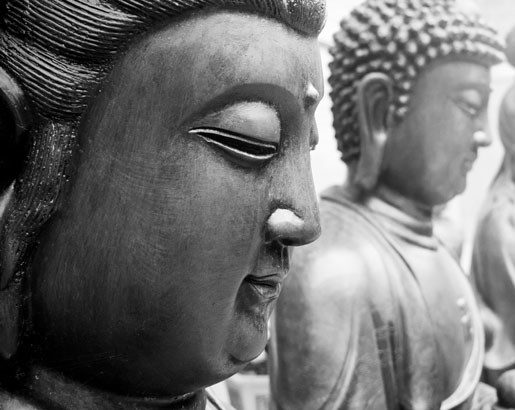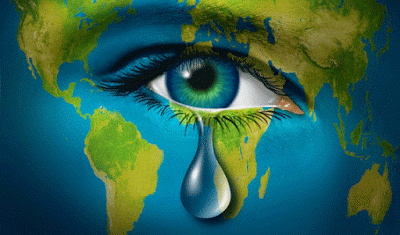The most difficult falsehoods to uncover are those that are wrapped in a truth.
 I’ve been encountering a key philosophical flaw in Buddhism, at least as its predominantly practiced in North America. Though subtle, and still underground, it has become quite pervasive.
I’ve been encountering a key philosophical flaw in Buddhism, at least as its predominantly practiced in North America. Though subtle, and still underground, it has become quite pervasive.
A core premise and precept of Buddhism in the West has two parts. The first is that there is an infinite source of compassion and goodness that can never be destroyed.
Buddhists aren’t monotheists, and don’t believe in a Creator God, but they do hold there is an immanent cosmic intelligence accessible to all human beings. I share this aspect of their philosophy.
The second proposition, which is inextricably linked to the first in the Buddhists I’ve been talking with, is that the human spirit arises from and is inextricably connected to this cosmic source, and therefore it too can never be destroyed.
That last clause is the error, and it is a doozy. It amounts to a cunning and comforting evasion of the deadness of America and the crisis of human consciousness, as well as the urgency of radical change and transmutation.
To understand why the idea of human spiritual indestructibility is in error, and how it is contributing to the perilous erosion of the human spirit, it’s necessary to look at basic notions about order and disorder.
Christianity, and even Western science (which after all was largely built upon its foundation), begins with the premise of cosmic disorder moving toward growing order, culminating in man. To Christians, “God said, ‘Let there be light,’ and there was light.'” To devotees of reason, man creates order out of disorder. It pretty much amounts to the same thing.
For Buddhists, order, from the beginning of the universe and before, is a given. All forms in the cosmos and on earth are expressions of the unfolding order of the universe. This is a more sound philosophical view than the disorder-to-order model, and though I’m not a Buddhist, I subscribe to it.
The mistake begins with failing to see the disorder that man is generating; to understand that it is something new and antithetical to the order of nature; and to perceive the crisis of consciousness that grows out of it.
In the hundreds of millions of years of complex life on earth, no other species has had the power of Homo sapiens. A sentient species is now in the process of bringing about the sixth mass extinction in the history of life on earth. That raises the deepest questions, for both the religious and scientific minds, about our place in the universe.
Buddhists have a clever way of avoiding this disturbing and discomfiting truth, and the existential questions it raises. They fall back on the idea of the indestructibility of the source of life, and link the human spirit to it.
That allows them to believe radical change isn’t urgently necessary. After all, if the human spirit is indestructible, humans and humankind have an endless number of chances to change course.
That simply isn’t so, not for an individual, and not for the misnomer humans have given themselves–Homo sapiens.
This worldview also leads to a soft (and even not so soft) misanthropy and nihilism. More and more people who hold the notion, ‘So what if man goes extinct; then the earth will be wiped clean of man’s corruption and disorder. She will recover, and another, hopefully more intelligent sentient species will evolve.’
I usually respond by asking proponents of this view (which is much more widely held than you might think) if they have children. I point out that such misanthropy, however whitewashed with caring about the earth, is really self-hatred. None of us can separate ourselves from the destructiveness and fate of humankind.
It’s true that the infinite is always present, and self-knowing individuals can access it through initiating the movement of negation. But both individuals and sentient-potentially-sapient species can run out of chances to change course and begin to grow into the beings that cosmic intelligence meant for us to grow.
Especially when a sentient species destroys the viability and diversity of life on its planet. It may be that experiments in consciousness such as Homo sapiens run out of chances to change course and begin realizing their spiritual potential in direct proportion to the degree to which they decimate their planets.
The whole of humanity is enfolded in microcosm within every individual, so every true individual is responsible for the whole of humanity.
Is this our last chance to change course as a species? We cannot know beforehand, so there is no choice but to think, feel and act like it is.
Martin LeFevre

